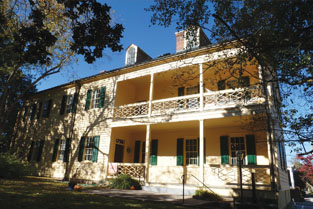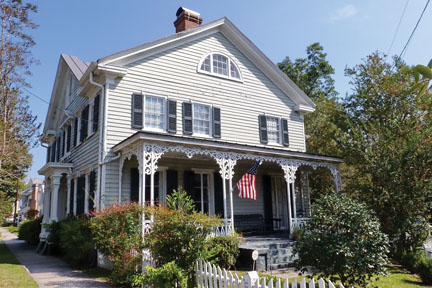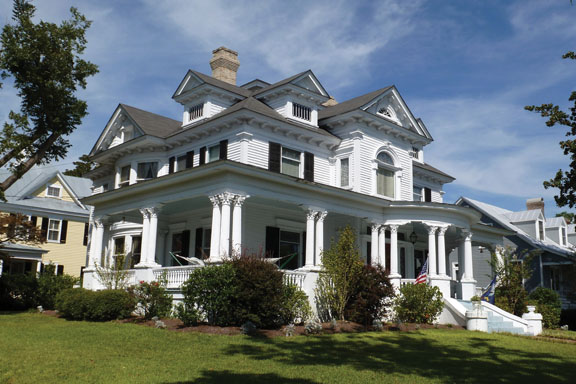Listed on the National Register of Historic Places, the Coor-Gaston house displays an unusual combination of Chinese trellis porch railings and an interior finished with Georgian detailing. The house was enlarged in 1850 to its present 4000+ square feet, but the original 1797 structure still stands at the corner of Craven and New Streets in downtown New Bern.
Its architect was James Coor, a prominent citizen and naval architect. Coor also designed the Smith-Whitford House and the Coor-Bishop House, though the latter was much changed in the nineteenth century by prominent architect H.W. Simpson. His house is named Coor-Gaston because Judge William Gaston owned it for many years after Coor’s death in 1799. Gaston was a jurist and legislator and famous nation-wide when we were a new country. In some ways Gaston’s contributions eclipse those of James Coor, but James Coor represented Craven County in the First Provincial Congress, which produced the New Bern Resolves.
According to research by Gertrude Caraway, Coor was “probably” born in England in 1737, but settled in Maryland where he became a naval architect. Thomas Webber, who owned land here and in Maryland, brought Coor to New Bern, where he served as an architect and builder: of boats, of houses, and of the revolutionary cause.
In the summer of 1774, Coor represented Craven County at the First Provincial Congress. James Coor also attended the Second Provincial Congress and served in the Committees of Safety here in New Bern and in Beaufort, helping to enforce the boycott of British imports to the Carolinas.
The New Bern Resolves are the published minutes of the First Provincial Congress; their provenance is less troubled than the later Mecklenberg Declaration. Though the New Bern Resolves do not declare independence from the Crown, they were an strong first step by North Carolina in the iterative process of declaring full independence. As the Resolves themselves state, the signers felt compelled to speak out, “lest silence should be construed as acquiescence” to the new and punishing tariffs on tea and other British goods levied by the British Parliament.
The subject matter of the Resolves is wide-ranging. They approve the founding of the Continental Congress and elect North Carolina representation to it. They defend the actions of the Boston Tea Party and deplore the Intolerable Acts passed as a consequence against the colony of Massachusetts. But the Resolves also affirm loyalty to the Crown, and show that the colonists were actively proposing changes to forestall outright war.
Resolves were quickly adopted in other towns in North Carolina after the First and Second Provincial Congress meetings here in New Bern, but ours were the first Resolves in this colony. A celebration of the 246th anniversary of the Resolves will be held at Christ Episcopal Church in New Bern at 10:00 AM on August 29 of this year.
New Bern Preservation Foundation, Inc. • 510-B Pollock St. • www.newbernpf.org • info@newbernpf.org • 252.633.6448



